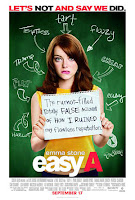 Directed by: Will Gluck
Directed by: Will GluckWritten by: Burt V. Royal
I must be totally up-front in admitting that this movie exceeded my expectations. That being said, my expectations were exceptionally low. Still, "Easy A" had its charms and moments which lifted it somewhat above the usual junk I had mistaken it for.
The movie begins with Olive (Emma Stone) accidentally telling a little white lie about her own promiscuity. When Marianne (Amanda Bynes) the leader of the campus Christian group hears, she turns it from a lie into a full-blown rumor which goes viral around the school. Olive decides to ride the rumor out, though, by taking on the public persona of an absolute whore. Meanwhile, behind closed doors, she's actually taking gift-card payments from her classmates to merely say that she's sleeping with them. Of course, as the lies begin to pile on top of each other, Olive's public and private lives begin to spiral out of control.
The film prominently features Olive wearing big red "A's" on her outfits in reference to Nathaniel Hawthorne's "The Scarlet Letter." Unfortunately, that's about as far as the literary and artistic merits of the movie go.
Too much of the movie felt aimless, directionless, and purposeless. This is especially evident via many of the supporting characers. For example, Thomas Hayden Church and Lisa Kudrow play a teacher-counselor pair working at the same school. Yet neither of their roles take on any importance, and they seem more like background furniture than relevant factors in the story. The same goes for Stanley Tucci, who plays Olive's father - I'm not quite sure what purpose his character served other than to deliver a few witty lines. I won't even mention the total waste of Malcom McDowell as the principal. Perhaps the most vibrant character is Marianne (Bynes), although that may have simply been because she is more of a caricature and less of a believable character.
For a straight-forward high-school comedy, though, this movie plays its cards pretty well. It admirably manages to balance a rather risque premise without lowering itself to using raunchy humor. There's a sub-plot about the boy Olive really likes, even though she's afraid to approach him given her reputation, and it comes across effectively - cute without being overly sweet.
I can't say I totally enjoyed this movie, but I can say that I didn't hate it, which is much better than I expected.


